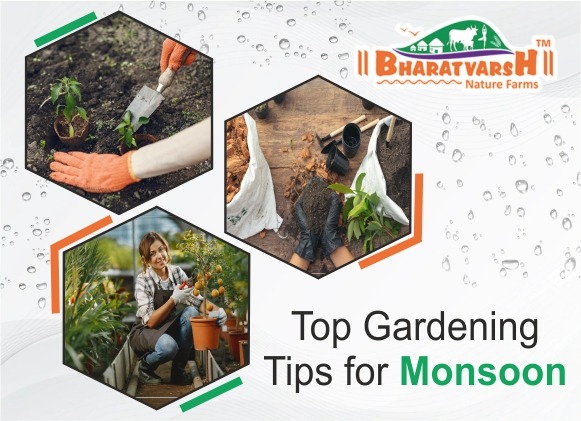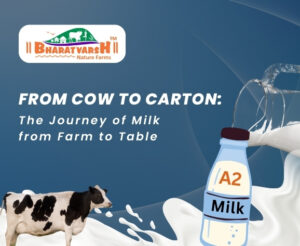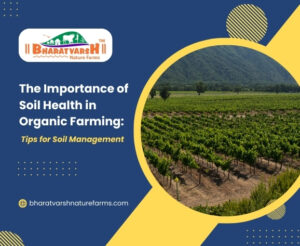Everyone in India eagerly awaits the monsoon season, which begins in late June. The cloudy sky, the first rain and the smell of moist earth are indescribably pleasant. The cool, moist air of the monsoon pervades the whole area.Long nature showers, a nice wind is a moment to relax for us and is also a perfect season for plants. They get all the natural nutrients in the form of precipitation and hence grow and bloom faster than usual. Therefore, the nursery workers, farm owners, and those who have home gardens and a passion for indoor plants must take extra care of their plants during this season.
Gardening can be a great way to be closer to nature, spend more time outside, and beautify your yard. Monsoon season, however, may be a tricky one for our favorite greens due to excessive rain fall. The modification of water, light, and even the change of plant’s surroundings might help them your garden plants. Preparing your garden for the monsoon will not only protect it but will also help it to thrive. Also, you must refer to the list of most common seasonal veggies to cultivate in the wet season.
Read on for gardening advice during the monsoon season.
1. Rainwater Harvesting
Collecting rainwater is the best approach to nourish any garden during the monsoon. You must take care not to over water your plants during this season. Water only when the soil is dry, or the leaves are drooping. Rainwater may be collected and used as a spray on plants to refresh them and support appropriate development. It contributes consistently to feeding your plants, shrubs, and trees, and sets the way for a lush, well-watered, and fresh garden.
2. Indoor Seed Starting
Starting seeds inside during the monsoon season gives you a few more weeks of growing time since the severe weather may impede plant development. You may start your seeds in pots or trays; windowsills are the best place to put them since they receive plenty of light.
Not all seeds, however, should be started inside. Cabbage, lettuce, tomatoes, broccoli, Brussel sprouts, and other crops thrive. Plants with slower root growth systems, such as eggplant, peppers, cauliflower, and celery, should also be started inside. There are no hard and fast rules on what you may start inside. It varies depending on your preferences, experience, region and plant.
3. Trim Regularly to Allow Fresh and Healthy Growth
If your trees have long branches, strong winds may sweep them away, wreaking havoc on the rest of your garden. Trim the tree’s limbs and remove any dead or dry leaves that have fallen. Trim the plants to encourage flowering and keep them from growing out of control throughout the season. Remove withered flowers from their stems, and if the grass looks parched, give it an excellent mowing to revive it. Hiding maintains the garden tidy, fosters the development of new plants, and provides a nutritious diet for all plants.
4. Install Row Covers in Case of Heavy Rains
Row covers, also known as garden cloth, are a fine, thin, light material used to protect crops from inclement weather. It is usually made of polyester and does not hold moisture. However, it allows sufficient light and moisture to get through. Row coverings may survive for many seasons, depending on the quality of the material and how they are used.
5. Provide Enough Fertilization
Natural fertilizers in plants, such as manuring, composting, and chewing around the plants are healthier and better than artificial fertilizers because vital nutrients soak through the soil with rains. Because the pores of the plants open during rains, compost is absorbed by the plants as soon as it is employed. If you are taking up kitchen composting process,use tea bags, eggshells, and other kitchen trash to help enrich the compost and keep the garden fresh. Mulching is a method of applying nutrients to the soil. It aids in the nutrition of the plants and their sound development.
6. Regularly Inspect the Soil
It is usual for severe rains to sweep away the healthy layer of soil. Checking your soil, therefore, is another critical component that contributes to the effective development of your plants. Ensure the soil is porous enough to enable water to get through without becoming congested around the root region. Mix the organic compost with soil to loosen it, which will aid in water absorption. If water cannot readily penetrate the plants, moss or algae will grow around them. You’ll have to get your hands filthy here to eliminate the sticky algae.
7. Weeding
Like flowering plants and vegetables, weeds also grow fast during the monsoon season. They interfere with plant feeding and typical development. Weeding before the monsoon helps to prevent weeds from taking critical nutrients from the soil. It is often simpler to remove weeds while they are young. However, weeding must be done daily during monsoon season to safeguard the garden.
8. Select Appropriate Plants and Provide Proper Protection.
There are various plants, which can thrive well in your kitchen garden during the wet season. We should select only plants that can withstand the harsh conditions and high wetness levels of the monsoon season should be planted. Use perforated sheets as shades / cover to protect plants that are young or which are not able to adjust towards seasonal changes. A suitable cover also avoids soil erosion during showers and guarantees that rainfall reaches and feeds the whole garden area.
Contact Bharatvarsh Nature Farms for your gardening requirement
Bhartavarsh Nature Farms is a large producer and wholesaler of plants of various types, and has several special plant varieties on display at the nursery section. There is a retail display of plants at Bharatvarsh Nursery, next to Ram Coolers Factory at Umergaon. Bharatvarsh Nursery also supplies bulk requirements of plants immediately as per the requirements and availability. If you want some special plants, the nursery can procure them from different regions and supply those plants too. Being a wholesale plant nursery, all the plants are available at very reasonable prices and even the gardening essentials are provided at lesser prices compared to market.
We also provide our expertise and service to beautify and maintain landscaping of your garden. Reach out Bharatvarsh Nature Farms to discuss how we can help you with your at-home gardening this season.
For more details, please visit our website: www.bharatvarshnaturefarms.com
You can call us @ 8650214214 or 8603214214.




